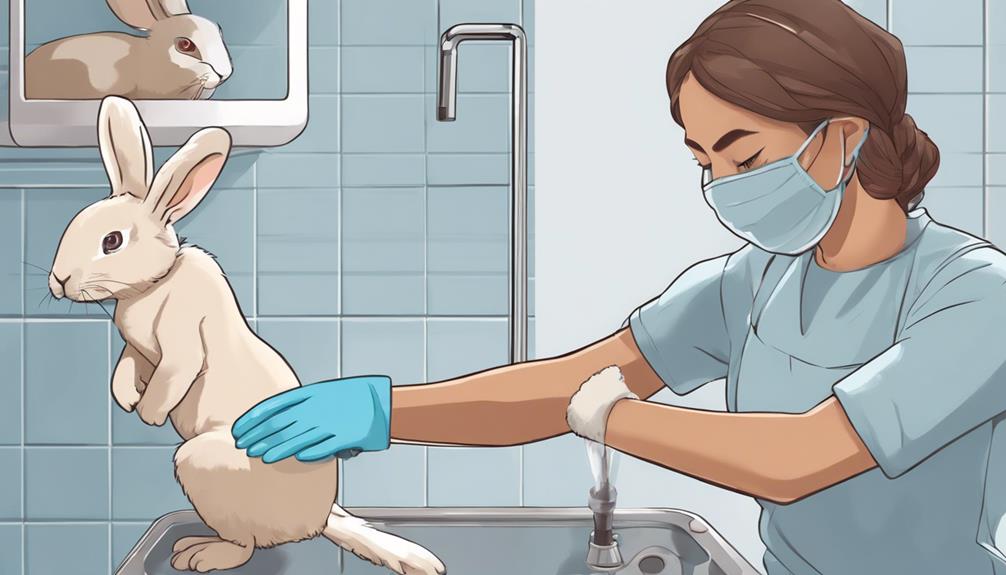10 Tips: Understanding Human Allergies to Rabbits
If you're dealing with rabbit allergies, here are 10 tips to help you understand and manage them better. Rabbit dander contains proteins that trigger immune responses, causing typical allergy symptoms like sneezing and itchy eyes. Strategies to reduce exposure include cleaning living spaces and using HEPA air purifiers. Wearing a mask and washing hands can prevent reactions. Take steps to minimize allergen levels, like grooming your rabbit regularly and investing in hypoallergenic bedding. Create rabbit-free zones in your home and consider allergy testing for specific triggers. Implement these tips for relief and consult with a professional for personalized advice.
Rabbit Allergies: An Overview
Understanding rabbit allergies begins with recognizing the common symptoms and triggers associated with this specific type of allergy. Allergy triggers related to rabbits primarily stem from their dander, which consists of tiny, microscopic flecks of skin that rabbits shed. Rabbit dander contains proteins that can be a significant source of sensitivity for individuals prone to allergies. Preventing allergic reactions involves minimizing exposure to these allergens through various strategies.
If you have a sensitivity to rabbit dander, it's crucial to create an environment that reduces your contact with these allergens. Regularly cleaning your living space, particularly areas where your rabbit spends time, can help decrease the presence of dander. Using a HEPA air purifier can also aid in filtering out airborne particles, including rabbit dander, thus lowering the likelihood of an allergic reaction.
When interacting with rabbits, consider wearing a mask to limit inhalation of dander and washing your hands after handling them. Additionally, designating specific clothing for rabbit interaction can prevent the spread of allergens to other areas of your home. Being mindful of these prevention measures can significantly alleviate your symptoms and improve your overall comfort when around rabbits.
Common Symptoms in Allergy Sufferers
What're some common symptoms that allergy sufferers may experience when exposed to rabbit dander?
Allergies to rabbits can manifest in various ways, causing discomfort and distress. If you're allergic to rabbits, you may experience symptoms such as sneezing, runny or stuffy nose, itchy or watery eyes, coughing, wheezing, chest tightness, skin rashes, or hives upon exposure to rabbit dander. These symptoms occur due to your immune system overreacting to proteins found in the rabbit's saliva, urine, or dander.
If you suspect you have a rabbit allergy, it's essential to consult an allergist for proper diagnosis and management. Allergy testing can help identify specific triggers and confirm if rabbits are the cause of your symptoms. Once diagnosed, your allergist can recommend treatment options and strategies for symptom management. Avoidance of rabbit exposure is the primary method to prevent allergic reactions. Regular cleaning, using HEPA filters, and keeping rabbits out of certain areas in your home can help reduce allergen levels.
In severe cases, your allergist may prescribe medications such as antihistamines, decongestants, nasal corticosteroids, or allergy shots (immunotherapy) to alleviate symptoms and build tolerance. Understanding your allergies and taking proactive measures can significantly improve your quality of life when living with a rabbit allergy.
Understanding Rabbit Allergens
If you have experienced symptoms of rabbit allergies, it's important to be aware of the specific proteins in rabbit saliva, urine, or dander that trigger your immune response. Rabbit fur and dander contain these proteins that can act as allergic triggers for susceptible individuals. When exposed to these allergens, your immune system can become sensitized, leading to the release of histamines that cause typical allergy symptoms such as sneezing, itching, and nasal congestion.
To manage rabbit allergies, it's crucial to understand the role of histamines in your body's response. Antihistamines can help alleviate these symptoms by blocking the histamine receptors. Additionally, environmental control measures like regularly cleaning your living space, using air purifiers, and minimizing direct contact with rabbits can reduce allergen exposure.
Lifestyle adjustments are also essential in coping with rabbit allergies. Consider creating a designated rabbit-free zone in your home, washing your hands after handling rabbits, and washing rabbit bedding frequently to minimize allergen accumulation. If you have severe allergies, consult with an allergist for personalized advice and treatment options.
Factors That Influence Allergic Reactions
To effectively manage your rabbit allergies, understanding the factors that influence allergic reactions is crucial for improving your quality of life. Environmental factors play a significant role in triggering allergic reactions to rabbits. Dust, pollen, and mold in the environment can exacerbate your symptoms, making it essential to keep your living space clean and well-ventilated. Investing in air purifiers and regularly cleaning your rabbit's living area can help reduce exposure to these environmental allergens.
Genetic predisposition also plays a key role in determining how your body reacts to rabbit allergens. If you have a family history of allergies, especially to animals, you may be more likely to develop rabbit allergies. Understanding your genetic predisposition can help you take proactive measures to manage your allergies effectively. Consult with an allergist to determine if genetic factors contribute to your allergic reactions and to explore personalized treatment options.
Incorporating these insights into your allergy management plan can significantly improve your quality of life. By addressing environmental factors and considering your genetic predisposition, you can better control your allergic reactions to rabbits. Remember, everyone's allergy triggers may vary, so it's essential to work closely with healthcare professionals to develop a personalized approach to managing your rabbit allergies.
Cross-Reactivity With Other Allergens
Understanding how rabbit allergens can cross-react with other common allergens is important for managing your allergies effectively and comprehensively. Research findings have shown that individuals allergic to rabbits may also experience allergic reactions to other furry animals like cats and dogs due to allergen cross-reactivity. This means that the proteins in rabbit dander that trigger your immune response are similar to those found in other animals, leading to cross-sensitization.
Identifying cross-reactive allergens is crucial in managing your reactions. If you have a known allergy to rabbits, it's advisable to avoid exposure to other furry pets that might share similar allergenic proteins. Consulting with an allergist for comprehensive allergy testing can help pinpoint specific triggers and potential cross-reactive allergens. By understanding which allergens may cause cross-reactivity, you can take proactive measures to reduce your exposure and minimize allergic reactions.
Managing reactions to cross-reactive allergens involves implementing strategies to reduce allergen exposure. Regularly cleaning your living space, using air purifiers, and grooming pets frequently can help decrease allergen levels in your environment. Additionally, washing your hands after handling animals and avoiding touching your face can help prevent allergic reactions. By being aware of potential cross-reactive allergens and taking proactive steps to manage your allergies, you can better control your symptoms and improve your quality of life.
Managing Rabbit Allergies at Home
Managing rabbit allergies at home requires implementing practical strategies to reduce allergen exposure and alleviate symptoms effectively. To start, consider creating allergy-free zones in your home. Designate specific areas where your rabbit isn't allowed, such as bedrooms, to minimize exposure to allergens. Additionally, regularly clean these areas to remove rabbit dander and fur that may trigger allergic reactions.
Incorporating household tips can also help manage rabbit allergies. Use a high-efficiency particulate air (HEPA) filter in your home to reduce airborne allergens. Vacuum frequently with a HEPA filter-equipped vacuum cleaner to capture rabbit dander effectively. Wash your hands after handling your rabbit and consider wearing a mask while cleaning their living areas to minimize allergen exposure.
Coping strategies are crucial for dealing with rabbit allergies at home. Consider grooming your rabbit regularly to reduce shedding and dander. Bathing your rabbit can also help reduce allergens on their fur. If possible, consider investing in hypoallergenic bedding to further minimize exposure to allergens while you sleep.
Seeking Professional Allergy Testing

Consider scheduling professional allergy testing to accurately identify specific triggers and develop a targeted treatment plan for managing your rabbit allergies effectively. Seeking professional consultation is crucial for individuals experiencing severe allergic reactions to rabbits. Allergy testing conducted by trained professionals can pinpoint the exact allergens causing your symptoms, whether it be rabbit dander, urine, or saliva.
During allergy testing, various methods such as skin prick tests or blood tests are employed to determine your specific sensitivities. These tests are essential in understanding the severity of your allergies and can help in devising a personalized management strategy. A professional allergist will interpret the results and provide detailed insights into how to minimize exposure to rabbit allergens in your environment.
Furthermore, with the guidance of a medical expert, you can explore appropriate treatment options ranging from medications to immunotherapy. By understanding your allergy triggers through professional testing, you can take proactive measures to reduce symptoms and improve your quality of life as a rabbit owner.
Allergy Relief Options for Rabbit Owners
To alleviate your rabbit allergy symptoms effectively, explore various relief options tailored to your specific sensitivities. Allergy prevention is key in managing your reactions to rabbits. Start by creating a designated rabbit-free zone in your home where you can retreat when your symptoms flare up. Investing in a high-efficiency particulate air (HEPA) filter for your living space can help reduce the amount of rabbit dander in the air, thus lessening your exposure.
Relief strategies can also include over-the-counter antihistamines to alleviate itching, sneezing, and other mild allergy symptoms. Nasal corticosteroid sprays can be beneficial in reducing nasal inflammation and congestion. If your allergies are severe, your healthcare provider may prescribe stronger medications or allergy shots to help desensitize your immune system over time.
Regularly grooming your rabbit, preferably outside or in a well-ventilated area, can also help minimize allergen exposure. Wearing a mask while cleaning your rabbit's cage or interacting with them can further reduce the amount of allergens you inhale. Consider using allergen-reducing bedding for your rabbit's enclosure and washing your hands immediately after handling them.
Preventing Allergic Reactions Around Rabbits

Creating a rabbit-friendly environment can significantly reduce the risk of allergic reactions when interacting with rabbits. Allergy prevention is crucial when it comes to rabbit care and ensuring a comfortable living space for both you and your furry friend. Understanding triggers that might exacerbate your allergies is key to maintaining a harmonious relationship with your pet.
To prevent allergic reactions around rabbits, start by establishing designated rabbit-free zones in your home. This could be particularly beneficial in areas where you spend a lot of time, such as your bedroom. Keeping these areas clean and free of rabbit dander can help minimize exposure to allergens. Additionally, investing in an air purifier with a HEPA filter can help trap airborne allergens, including rabbit hair and dander.
Regular grooming of your rabbit is essential for allergy prevention. Brushing your rabbit frequently can help reduce shedding and minimize the spread of dander. It's also advisable to wash your hands after handling your rabbit and avoid touching your face to prevent transferring allergens.
As a responsible pet owner, being proactive about allergy prevention is part and parcel of caring for your rabbit. By creating a rabbit-friendly environment and understanding potential triggers, you can enjoy a fulfilling companionship with your pet while keeping allergic reactions at bay.
Living With Rabbit Allergies: Tips & Tricks
Living with rabbit allergies can be challenging, but with the right strategies, you can still enjoy a harmonious relationship with your furry friend. One helpful tip is to consider pet-friendly antihistamines. These medications can help alleviate allergy symptoms when you're around your rabbit. Consult with your healthcare provider to find the most suitable antihistamine for your specific allergies.
Another useful approach is to choose hypoallergenic rabbit breeds. While no rabbit is completely hypoallergenic, some breeds produce fewer allergens than others. Breeds such as the Rex, Mini Lop, or Dutch rabbits are known to be more hypoallergenic. Spending time with hypoallergenic breeds may reduce the likelihood of triggering your allergies.
In addition to medication and choosing the right breed, maintaining a clean living environment is crucial. Regularly clean your rabbit's living space, wash your hands after handling them, and consider using an air purifier to minimize allergens in the air. These simple steps can significantly reduce your exposure to allergens and help you coexist comfortably with your beloved rabbit despite your allergies.
Frequently Asked Questions
Can Allergies to Rabbits Develop Suddenly in Adults?
Allergies to rabbits can indeed develop suddenly in adults. It's not uncommon for adult onset rabbit allergies to surprise you with their sudden appearance.
Your immune system may start reacting to proteins in rabbit dander or saliva, triggering allergy symptoms like sneezing, watery eyes, or skin rashes.
If you suspect you have developed an allergy to rabbits, consult with a healthcare provider for proper diagnosis and management strategies.
Do Certain Rabbit Breeds Produce Less Allergens?
When considering rabbit breeds comparison for allergy prevention, it's worth noting that some breeds may produce fewer allergens. Grooming plays a role in reducing allergens, so opt for breeds that require less grooming.
Look into hypoallergenic breeds, as they may be better suited for individuals with allergies. Remember, while certain breeds may be less likely to trigger allergies, it's essential to consult with a healthcare professional before bringing a rabbit home.
Are There Any Natural Remedies for Rabbit Allergies?
If you're looking for relief from rabbit allergies, there are some natural remedies you can try.
Natural remedies like saline nasal rinses, air purifiers, and steam inhalation can help alleviate symptoms.
Allergy prevention is key, so make sure to keep your living space clean, use allergen-proof covers on pillows and mattresses, and wash your hands after handling rabbits.
Remember to consult with a healthcare professional for personalized advice on managing your allergies.
Can Allergy Shots Help With Rabbit Allergies?
Allergy shots can be effective in managing rabbit allergies. They work by gradually desensitizing your immune system to rabbit allergens.
While not an instant fix, they can provide long-term relief by reducing your body's allergic response over time.
It's essential to consult with an allergist to determine if allergy shots are the right option for you and to discuss a comprehensive plan for managing your rabbit allergies effectively in the long term.
Is It Possible to Outgrow Rabbit Allergies Over Time?
Yes, it's possible to outgrow rabbit allergies over time. Allergies can change, and some individuals may experience a decrease in symptoms as they age. This can be influenced by genetic predisposition and long-term effects of exposure to allergens.
Consulting an allergist can help you monitor any changes and provide guidance on managing allergies effectively. Keep track of your symptoms and stay informed about potential triggers for better allergy management.
Conclusion
Living with rabbit allergies can be challenging, but with the right knowledge and precautions, you can still enjoy the company of these furry friends.
Remember to seek professional allergy testing, explore relief options, and take steps to prevent allergic reactions.
By understanding rabbit allergens and how they can affect you, you can make informed decisions and create a safe environment for both yourself and your beloved rabbits.
Stay informed, stay proactive, and enjoy a happy and healthy life with your furry companions.
